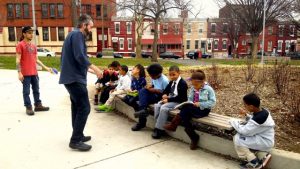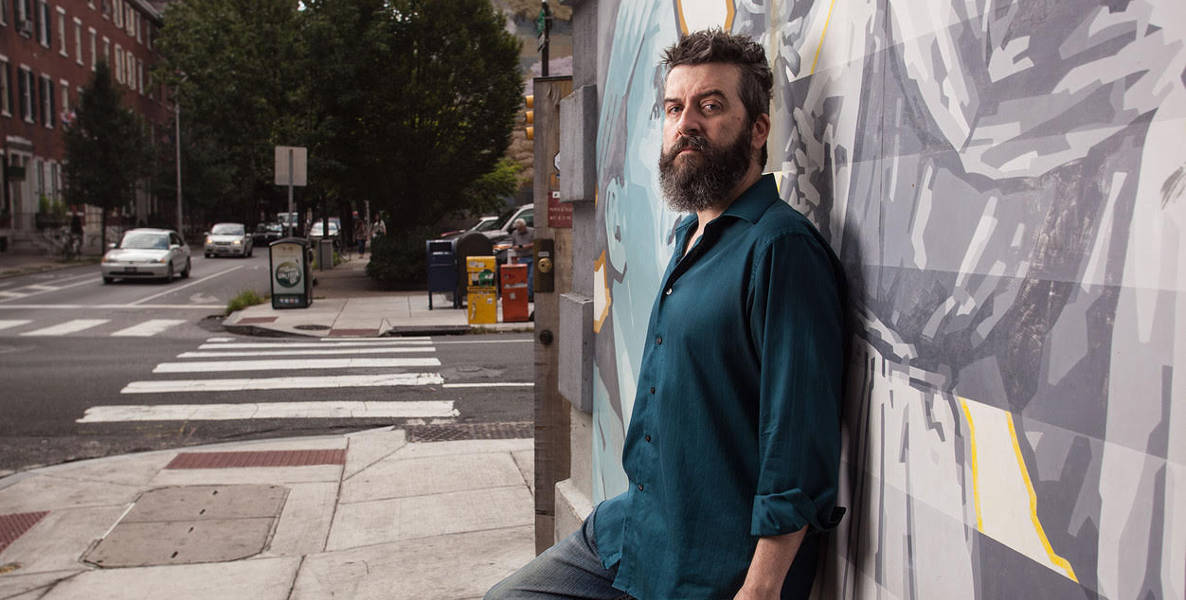It’s been two years now since I got the call letting me know I was to be Philadelphia’s new Poet Laureate. I was in bed. Lindsay So from the Office of Arts, Culture & the Creative Economy called to inform me that I’d been selected to be the city’s poetry representative for 2014-15. There was Sonia Sanchez first—and now me. Whaaa? It was so overwhelming that I immediately took a nap. A really satisfying nap. When I woke up, I thought I might have dreamed the whole thing, so I called Lindsay back, just to confirm that we had actually talked and that I was really going to be laureate. Yep. It was happening.
The press conference was wonderful. I got to hang out in the Mayor’s office. There’s a whole wall there that’s lined with shiny shovels for groundbreaking ceremonies. I don’t know why, but I got really excited about that. I met our inaugural Youth Poet Laureate, Siduri Beckman, for the first time. She was elegant and sophisticated beyond her years. She was elegant and sophisticated beyond my years, and I’m three times her age. I asked her if she had any advice for me. She told me, “Smile a lot.” That was the first time I thought, “Oh no. I might be in trouble.”
I’ve always been drawn to the notion of the poet as cartographer (a maker of maps), and WYB became a vehicle for people in every corner of the city to chart their street with a poem. Philadelphia is its own anthology, and the poets included are on the subway, in bars, in churches, our schools and our jails.
But I did smile a lot in the months that followed, and it wasn’t even fake. I got shout-outs in the street from librarians, one percenters (the bikers not the bankers), block captains and school teachers. I didn’t smile all the time, though. Drunks recited poems at me that they had memorized in school. Academics asked with suspicion how I got the position. And, of course, there was hate(r) mail. Believe it or not, poets can be terrible people too. Aside from the highs and lows, there was a question that was asked over and over:
“What does a Poet Laureate do?”
My answer: Be a face for poetry. Raise the art form’s profile in the city. Chip away at the notion of poetry as a hermetic, alienated practice. Bring it into our everyday city living. Make it interactive. Participatory. Inviting. I liked that response. Next question… how?
I developed a program called Write Your Block to address some of these challenges, with the intent of providing space and opportunity for Philadelphians to explore their neighborhoods via poetry. I’ve always been drawn to the notion of the poet as cartographer (a maker of maps), and WYB became a vehicle for people in every corner of the city to chart their street with a poem.

With support from the Philadelphia OACCE and The Philadelphia Citizen’s Jenn McCreary—a 2013 Pew Fellow for poetry— I developed a downloadable toolkit to provide ways a poem can be used to map personal landmarks, histories, traditions and experiences that help identify our communities. Philadelphia is its own anthology, and the poets included are on the subway, in bars, in churches, our schools and our jails. This is a body of work that will continue to develop long after I’ve come and gone as Laureate. I was happy to make Write Your Block a thing, and will be proud to see it live on in its 2016 manifestation, here at The Citizen. (WYB can be found here right now; it will move to The Citizen in a few weeks.)
For my part, I conducted a WYB teaching artist workshop through the Bartol Stockton Rush Foundation, taking art educators on a walking/writing tour in the vicinity of 15th & Cherry. I also conducted six-week workshops with kids from Mighty Writers West in Mantua, and Taller Puertorriqueño in Kensington.
Some of the young people were home schooled; others were in after school programs. We visited a park in Fairhill, where some of the grown-ups hanging around were suspicious of a group of young people writing in notebooks. One guy wanted to know what they were writing. A workshop kid excitedly told him, “We’re writing poems about the neighborhood!” He nodded and said, “That’s what’s up. I could write some poems about this neighborhood too.” I don’t know if he ever did, but I hope so.
In Mantua, some parents were initially nervous about their children walking the streets in search of the poems around them. “When I first heard my daughter was going to be walking around the neighborhood and writing what she saw, I didn’t want her to have any part of it,” a mother told me afterwards. “She wanted to write, so I let her go. I’m grown. I’ve seen these streets. But when I saw what she saw, compared to what I see… it was really beautiful. Thank you.”
I was lucky to experience these moments firsthand, but there were many more WYB poems that came from all over the city. They were springing from places and events that I had no idea were even happening. There were poems generated from a father/daughter dance in Port Richmond, school assignments, library exercises in Wynnefield, and individuals who found out about the project by word-of-mouth. One block in Germantown threw a writing party to write about their street. Some of those neighbors had never written a poem before.
Submissions came in from every neighborhood, written by children, political figures, seasoned poets and citizens returning from prison. They talked about the streets they live in and the issues that affect them—police brutality, under-funded schools, crime, trash, the kindness of neighbors, the beauty of trees and the power of love.
“When I first heard my daughter was going to be walking around the neighborhood and writing what she saw, I didn’t want her to have any part of it,” a mother told me. “She wanted to write, so I let her go. I’m grown. I’ve seen these streets. But when I saw what she saw, compared to what I see… it was really beautiful. Thank you.”
I’ve been fortunate to share these years with Philadelphia, doing the thing I love best. I’m grateful to get to expand my horizons and get to know poets I should have known before, but didn’t. I am blown away by the young poets coming out of our schools. The kids and mentors from Philadelphia Youth Poetry Movement are champions in every way. Their talent, solidarity and integrity are examples of how I wish more grown-up poets would act.
I had the honor of working with 2015-16 Youth Poet Laureate David Jones. (Watch out for this guy in the years to come! I’m serious.) And his predecessor Soledad Alfaro-Allah? I can’t even… I know I was supposed to be her mentor, but she’s the one who inspired me—to be a better writer and a better human.
It turns out maybe it was a dream after all. But something real happened, and it won’t end when my time as laureate is over. That something is this city, this poem—Philadelphia. The neighborhood stories will live on, through Write Your Block and through the innovative, engaging work of the next poet laureate. I’ll be there later this month at the mayor’s press conference to embrace my successor and pass the laurels on. It’s not my style to tell people to smile. And I know from experience that I won’t have to.
Frank Sherlock, a 2013 Pew Fellow for poetry, was Philadelphia’s second Poet Laureate, from January 2014 to December 2015.
Header Photo: Colin Lenton




